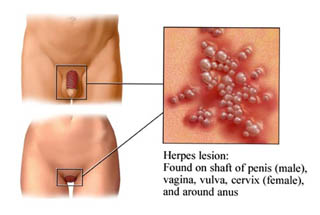
Herpes attacks on the genital area are caused by either two strains of herpes simplex virus: HSV 1, which is linked primarily with cold sores on the mouth and HSV 2, linked primarily with lesions on the rectum, vagina or pennis.
Infections with HSV 2 are generally without any symptoms. The truth is that ninety percent of people infected with this virus do not know it. However, they are contagious and may contribute to the spread of the disease by having unprotected sex. If they present, signs of herpes infection are evident within two to twenty days after contact with the virus.
The major signs of herpes infection are the presence of one or more blisters, which gradually fissure to become wet, painful sores that last about 2 to 3 weeks; fever; and normally pain in the lower abdomen. In the course of time these initial signs of herpes disappear, but the virus of herpes remains dormant in some of the body´s nerve cells, allowing timely recurrences of signs or near the site of the first infection. It is thought that skin irritation, sunlight, poor nutrition, anxiety and stress can bring on recurrences.
Recurrences are generally mild and last only about seven days. They may be recognized by an itching or twinkling feeling or itching in the genital region or pain down the leg or in the buttocks. For some people these primary signs may be can be the most annoying and painful part of an episode. Certain times only the itching and tingling are present, and no visible sores develop. At other times sores appear that may be really small and not quiet noticeable, or they may break into open sores that crust over then disappear. Herpes is highly infectious when a blister is present. Individuals with open sores must avoid sex with others until the sores vanish. Even if no blisters are present, transmission is achievable, even though much less likely, through the shedding of virus particles from the skin.
Whereas genital herpes attacks are caused most generally by HSV 2 and oral infections are provoked most commonly by HSV 1, both HSV 2 and HSV 1 can provoke oral and genital attacks with identical signs. Thus, people with oral herpes can transmit the virus to partners trough oral sex. They can also transmit to themselves through masturbation. Often times, blisters are present on other parts of the body where the virus has entered through the broken skin.
Herpes virus also can attack the eyes, leading to impaired vision and even blindness. If the virus is shown in the birth canal, newborn infants can be attacked, generally resulting in abnormal development and brain damage. Pregnant women who have had a former genital herpes attack must convey their physicians to stop transmission of HSV to their babies.
There is no cure for herpes, and people remain attacked for life. Medicines such as Acyclovir can reduce the severity and duration of the signs of an initial recurrence or an infection.